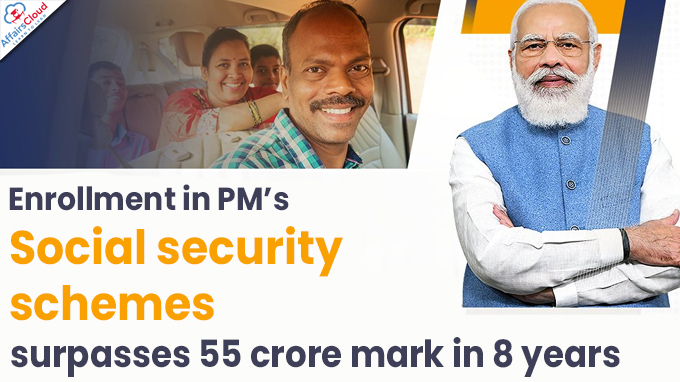 9th May 2023 marks the 8th anniversary of the three major social security (Jan Suraksha) schemes, Pradhan Mantri Jeevan Jyoti Bima Yojana (PMJJBY), Pradhan Mantri Suraksha Bima Yojana (PMSBY) and Atal Pension Yojana (APY).
9th May 2023 marks the 8th anniversary of the three major social security (Jan Suraksha) schemes, Pradhan Mantri Jeevan Jyoti Bima Yojana (PMJJBY), Pradhan Mantri Suraksha Bima Yojana (PMSBY) and Atal Pension Yojana (APY).
- Union Minister of Finance Nirmala Sitharaman stated that till 26th April 2023, 16.2 crore, 34.2 crore and 5.2 crore enrolments have been done under PMJJBY, PMSBY & APY respectively. The total enrollment under all three schemes are 55.6 crore.
Backdrop: The two low-cost insurance schemes of PMJJBY and PMSBY and the guaranteed pension scheme of APY were launched by Prime Minister Narendra Modi on May 9, 2015, from Kolkata, West Bengal.
- The three schemes were built under the initiative of ‘National Mission for Financial Inclusion’ which was launched to ensure that every citizen in India has access to banking facilities, financial literacy, and social security coverage.
Three social security schemes are dedicated to the welfare of the citizens, recognising the need for securing human life from unforeseen risks/losses and financial uncertainties.
The schemes were launched to expand the coverage of insurance and pension to provide the poor and marginalised sections of society the much-needed financial security through affordable products.
About the Schemes in Brief:
a.Pradhan Mantri Jeevan Jyoti Bima Yojana (PMJJBY):
i.Scheme Detail: It is an insurance scheme of the Ministry of Finance, offering life insurance cover for death due to any reason. It is a one-year cover, renewable from year to year.
ii.Eligibility:
- All individual account holders of participating banks/ Post offices in the age group of 18 to 50 years are entitled to join.
- People who join the scheme before completing 50 years of age can continue to have the risk of life cover up to the age of 55 years upon payment of the premium.
iii.Benefits:
- It offers a renewable one-year term life cover of Rs 2 Lakh to all the subscribing bank account holders in the age group of 18-50 years, covering death due to any reason for a premium of Rs. 436/- per annum per subscriber, to be auto-debited from the subscriber’s bank account.
- The scheme is offered/administered through LIC (Life Insurance Corporation of India) and other Life Insurance companies willing to offer the product on similar terms with necessary approvals and tie-ups with Banks / Post office for this purpose.
iv.Achievements: As on 26.04.2023, the cumulative enrolments under the scheme have been more than 16.19 crore and an amount of Rs. 13,290.40 crore has been paid for 6,64,520 claims.
b.Pradhan Mantri Suraksha Bima Yojana (PMSBY)
i.Scheme Detail: It is an Accident Insurance Scheme offering accidental death and disability cover for death or disability on account of an accident.
ii.Eligibility: Individuals in the age group of 18-70 years having a savings bank or a post office account are entitled to enroll under the scheme.
iii.Benefits
- On Death by accident – the Nominee shall get Rs 2 Lakh
- Total and irrecoverable disability due to accident – Rs 2 Lakh
- Partial disability – Rs 1 Lakh
iv.Premium: Rs.20 per annum per member. The premium will be deducted from the account holder’s bank account through ‘auto debit’ facility in one instalment on or before 1st June of each annual coverage period under the scheme.
v.Achievements: As on 26.04.2023, the cumulative enrolments under the scheme have been more than 34.18 crore and an amount of Rs. 2,302.26 crore has been paid for 1,15,951 claims.
c.Atal Pension Yojana (APY)
i.Scheme Detail:
- It is an old-age income security scheme to addresses the longevity risks among workers in the unorganized sector and encourages the workers to voluntarily save for their retirement.
- APY is administered by Pension Fund Regulatory and Development Authority (PFRDA) under the overall administrative and institutional architecture of the National Pension System (NPS).
ii.Eligibility:
- The minimum age for joining APY is 18 years and the maximum age is 40 years.
- The age of exit and start of pension would be 60 years. Therefore, the minimum period of contribution by the subscriber under APY would be 20 years or more.
- Exclusions: Tax Payers became not eligible to join APY from 1 October, 2022.
iii.Benefits: Subscribers would receive the guaranteed minimum monthly pension of Rs. 1000 or Rs. 2000 or Rs. 3000 or Rs. 4000 or Rs. 5000 at the age of 60 years, based on the contributions made by the subscriber after joining the scheme.
iv.Payment frequency: Subscribers can make contributions to APY on monthly/ quarterly / half-yearly basis.
v.Withdrawal from the Scheme: Subscribers can voluntarily exit from APY subject to certain conditions, on deduction of Government co-contribution and return/interest thereon.
vi.Disbursement of the Scheme Benefits:
- The monthly pension could be availed by the subscriber, and after him to his spouse and after their death, the pension corpus (as accumulated at age 60 of the subscriber) would be returned to the nominee of the subscriber.
- In case of premature death of the subscriber (death before 60 years of age), the spouse of the subscriber could continue contributing to the same APY account, for the remaining vesting period (i.e. till the original subscriber would have attained the age of 60 years).
vii.Contribution by Union Government:
- The minimum pension would be guaranteed by the Government, i.e., if the accumulated corpus based on contributions earns a lower than estimated return on investment and is inadequate to provide the minimum guaranteed pension, the Central Government would fund such inadequacy.
- In case the returns on investment are higher, the subscribers would get enhanced pensionary benefits.
viii.Achievements: As on 27.04.2023 more than 5 crore individuals have subscribed to the scheme.
Recent Related News:
As per the Ministry of Finance notification, those who pay income tax will not be allowed to enrol in the Government’s Social Security Scheme Atal Pension Yojana (APY) from October 1, 2022.
About Ministry of Finance:
Union Minister – Nirmala Sitharaman (Rajya Sabha- Karnataka)
Minister of State (MoS) – Pankaj Chaudhary; Dr. Bhagwat Kishanrao Karad




